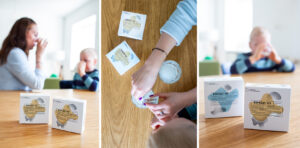
Monika Kotlarek: Mało kto wie, że stany depresyjne mogą pojawiać się nawet w wieku przedszkolnym
Magdalena Bury, HelloMama: „Depresja u przedszkolaka” – to brzmi nieprawdopodobnie. Skąd u tak młodego człowieka bierze się depresja?
Monika Kotlarek, psycholożka: Czynników może być kilka. Możemy mówić tutaj np. o depresji sytuacyjnej, gdy dziecko odczuwa silny stres związany z przeprowadzką, zmianą przedszkola czy ze śmiercią kogoś bliskiego. Depresja u dziecka może też pojawić się w momencie, gdy w jego mózgu zabraknie dopaminy, serotoniny, w ogóle endorfin, które są tzw. hormonami szczęścia. W takiej sytuacji jest ich zbyt mało, by można było funkcjonować zdrowo. Możemy też mówić o kwestiach genetycznych. Depresja u wcześniejszych pokoleń zwiększa ryzyko pojawienia się tej choroby u młodszych.
Czyli dziecko kobiety, która w ciąży zmagała się z depresją, jest nią w jakiś sposób obarczone?
Depresja, w taki bezpośredni sposób, nie jest zaraźliwa. Może się tak jednak zdarzyć, że jeśli ktoś w naszym otoczeniu choruje na depresję, jego nastroje mogą nam się udzielać.
Warto też wiedzieć, że w ciąży powinno się odstawić wszystkie leki, jakie dotychczas stosowano (oczywiście po konsultacji z lekarzem), również te psychiatryczne. Jest to spowodowane tym, że dziecko poprzez pępowinę mogłoby otrzymywać śladowe ilości tych leków, co w konsekwencji mogłoby utrudnić wydzielanie przez niego endorfin. Dziecko dostawałoby je z zewnątrz, przez leki. Jeżeli kobieta przed ciążą albo w jej trakcie zmagała się z depresją, mamy olbrzymie prawdopodobieństwo, że zachoruje na depresję poporodową.
Czego o depresji dziecięcej się nie mówi?
Tak naprawdę nie mówi się, że depresja dziecięca w ogóle występuje. Mało kto jest w stanie sobie uświadomić, że 6- czy 7-letnie dziecko może mieć depresję. No bo jak? Jakie ono ma obowiązki? Jaki stres? Jakie ma problemy?
Nasze dziecko może chorować na depresję, tak samo jak na cokolwiek innego. Może mieć ataki paniki, fobię, zaburzenia lękowe, nerwicę. Trzeba to oswajać. Im szybciej zareagujemy, tym szybciej mamy szansę na odpowiednie leczenie.
Depresja zawsze pojawia się z jakiejś przyczyny?
Są przyczyny depresji, natomiast nie musi być konkretnej sytuacji. Dziecko nie musi stracić babci czy dziadka, by ta depresja wystąpiła.
Depresja nie bierze się znikąd, nie pojawia się z powietrza. Po prostu mózg funkcjonuje właśnie w taki sposób.
Osobie dorosłej z depresją często nie chce się żyć. Nic nie sprawia jej radości. A jak jest z dziećmi? Objawy depresji u najmłodszych różnią się od tych u dorosłych?
Identyczne na pewno nie są. Dziecko się wycofuje, przestaje chcieć się spotykać z koleżankami i kolegami z grupy przedszkolnej, nie chce chodzić do przedszkola, nie chce bawić się swoimi ulubionymi zabawkami, izoluje się. Chce spędzać więcej czasu samemu, w swoim pokoju. Może mieć problemy ze snem, z jedzeniem – nie je w ogóle albo je bardzo dużo. Jest smutek, łzy, ogólne rozbicie. To są podobne objawy do depresji u osób dorosłych, natomiast trzeba zwrócić uwagę na to, co się dzieje u dziecka.
Generalnie mało kto uświadamia sobie, że stany depresyjne mogą pojawiać się nawet w wieku przedszkolnym i że dzieci w wieku 5-6 lat próbują się samookaleczać, by np. dać ujście negatywnemu napięciu, lękowi, bólowi wewnętrznemu. Mało kto zwraca na to uwagę. A to się zdarza. Nie w literaturze, a w naszym codziennym życiu.
Problemy nasiliła pandemia, przez którą dzieci nie mogą się odnaleźć. Nienauczone radzenia sobie ze stresem i napięciem uciekają się do takich, a nie innych, sposobów rozładowania tej negatywnej energii.
Skutkiem tego jest to, że czworo dzieci dziennie w Polsce próbuje sobie odebrać życie…
I jestem przekonana, że są to dane zaniżone. Trzeba być czujnym.
Wróćmy jeszcze do objawów. Co z objawami psychosomatycznymi? Dziecko też może je czuć?
Tak. Może czuć ból mięśni – tak jak przy grypie, może się pojawić ogólne osłabienie organizmu, przemęczenie, niechęć do aktywności fizycznej, a co za tym wszystkim idzie – bóle głowy.
To rodzice znają swoje dziecko najlepiej i to oni powinni widzieć, że to, co dzieje się z ich dzieckiem, nie jest normalne. Wtedy trzeba reagować.
Czy pogorszenie nastroju u dziecka trwa cały czas? Bez dni, w których wydaje się, że jest już lepiej?
Niestety, depresja potrafi czasami odpuścić. Bywają lepsze dni. Nie idealne, ale wyraźnie lepsze. Łatwo się w tym zagubić, jednak jeśli nasze dziecko choruje na depresję, to ona nie znika z dnia na dzień.
Trzeba też bardzo uważać na kwestię samobójstwa. Ludzie, którzy podjęli już decyzję odebrania sobie życia, czują ulgę i zwykle są wręcz radośni, że ich ból się zakończy, co skutkuje dobrym humorem.
Jak na diagnozę „depresja u dziecka” reagują jego rodzice?
To zależy czy ufają lekarzom i “wierzą” w problemy psychiczne. Jeśli tak – to zazwyczaj się boją, ale też podejmują walkę o dziecko. Pytają o możliwe leczenie, aktywnie szukają terapii, psychoedukują się.
Jeśli nie – rzadko podają dzieciom leki (lub wcale ich nie wykupują), twierdzą, że to lenistwo albo, że to taki wymysł i moda albo po prostu, że to niemożliwe.
Nie wszyscy rodzice chętnie podają kilkulatkowi leki przeciwdepresyjne…
Leki przeciwdepresyjne, tak jak wszystkie inne leki, mają skutki uboczne. Tylko tutaj musimy sobie odpowiedzieć na pytanie, co jest istotniejsze: czy ratujemy życie dziecka i godzimy się na pewien czas ze skutkami ubocznymi (typu nerwowość czy przyrosty masy ciała) czy nie.
Problemem jest też to, że leki psychiatryczne (także u dorosłych) są postrzegane jako „coś dla osoby nienormalnej, dla wariata”.
Niektórzy właśnie z tego powodu odmawiają ich przyjmowania, ponieważ nie chcą być przez to stygmatyzowani. Musimy więc wybrać, co jest dla nas najważniejsze.
Gdzie powinien szukać pomocy rodzic, który zauważy, że z dzieckiem coś się dzieje?
Przyczyn zachowania innego niż dotychczas może być wiele. Mogą to być niedobory witamin, więc na początku proponowałabym pójście z dzieckiem na badania krwi czy moczu. Takie podstawowe, by zobaczyć czy ze zdrowiem wszystko jest w porządku. Jeśli medycznie tak jest, a objawy nie ustępują, warto wybrać się do psychiatry dziecięcego, który będzie w stanie postawić odpowiednią diagnozę – po obserwacji dziecka, po wywiadzie z rodzicami.
Zawsze lepiej jest pójść do psychiatry i dowiedzieć się, że wszystko jest w porządku, że to np. okres buntu albo ogólne przemęczenie, niż przeoczyć np. depresję.
Jak wspierać dziecko w depresji? Co robić?
Nie bagatelizować. I wierzyć dziecku. Ono wie najlepiej, jak się czuje. Ufać. Być godnym zaufania. Edukować się o depresji. Współpracować ze specjalistami, rozmawiać z innymi rodzicami dzieci z depresją.
Jak wygląda leczenie dziecka chorującego na depresję?
Psychiatria dziecięcy dobiera odpowiednią dawkę leków przeciwdepresyjnych. Dla takiego maluszka to najczęściej jest najmniejsza dawka. Ważna tutaj jest też obserwacja i praca z dzieckiem, pilnowanie go i opieka nad nim. Jeżeli rodzice będą w stanie, zarówno czasowo, jak i finansowo, sobie z tym poradzić to warto jest spotkać się z psychologiem dziecięcym.
Gabinet psychologa dziecięcego wygląda zupełnie inaczej niż ten dla dorosłych. Znajdziemy w nim klocki, zabawki, kredki do rysowania. W ten sposób można dotrzeć do dziecka. Dzięki temu psycholog będzie w stanie obserwować zachowanie dziecka i to, czy zmienia się ono na lepsze. To jest tak jak z młodzieżą i dorosłymi. Najpierw musimy wyrównać nastrój, by w ogóle dało się pracować z takim pacjentem. I tu niezbędna wręcz jest farmakoterapia. Potem wchodzi psychoterapia z terapią dziecięcą.
Mówiłyśmy o leczeniu w domu. Kiedy dziecko trafia na oddział psychiatrii dziecięcej?
Najczęściej na oddziały trafiają dzieci po próbach samobójczych albo te, które się samookaleczają. W takich sytuacjach musimy działać bardzo systemowo, ponieważ są przypadki, gdzie w domu dzieje się coś, co pogłębia depresję u dziecka. Jeżeli w domu jest przemoc albo alkohol, musimy również zmienić środowisko, w którym dziecko się wychowuje. Co, jeśli dziecko pójdzie do szpitala, w którym zostanie wyleczone, a następnie wróci do patologicznego środowiska? To zupełnie bez sensu.
Mówimy o samookaleczaniu się kilkuletnich dzieci. Skąd takie maluchy wiedzą, że coś takiego jak „samookaleczenie” istnieje?
Biorąc pod uwagę to, że dzisiejszy dwu- i trzylatek potrafi bezbłędnie operować smartfonem czy tabletem, nie jest to nic dziwnego. To efekt internetu i braku kontroli nad tym, co ogląda dziecko. Jeśli dziecko dostaje smartfon z internetem, nawet przez przypadek może gdzieś wejść, w coś kliknąć i zobaczyć coś, czego nie powinno. Dzieci są bardzo podatne na takie sugestie.
Monika Kotlarek – psycholożka, absolwentka Uniwersytetu SWPS we Wrocławiu. Należy do Australian Society of Rehabilitation Counsellors. Pracowała jako 'mental health worker’ w Sydney. Aktualnie prowadzi sesje psychologiczne online, w formie wideorozmowy z pacjentami (www.psycholog-pomaga.pl), oraz blog psycholog-pisze.pl na którym od 2012 roku dzieli się wiedzą z zakresu psychologii i psychoterapii. Niedawno wydała książkę „Depresja, czyli gdy każdy oddech boli”, którą Hello Zdrowie objęło swoim patronatem medialnym.








































